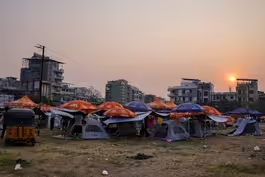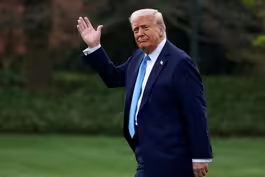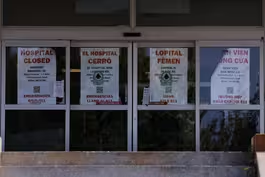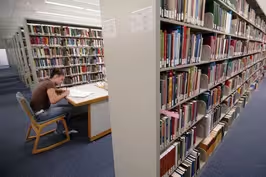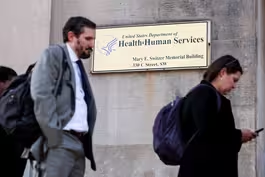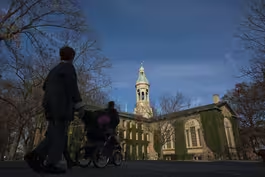
How food aid made it hard for Haiti to produce its own
Clip: 4/1/2025 | 10m 13sVideo has Closed Captions
How efforts to send Haiti cheap rice made it hard for the nation to produce its own
As the U.S. sees new tariffs, we look at how they can make or break an economy. In Haiti, U.S. policies forced the government to bring down tariffs on foreign goods, allowing American farmers to export crops cheaply. That made it expensive for Haitians to eat food grown domestically, leading to dependence on foreign aid. Special correspondent Marcia Biggs and videographer Eric O'Connor report.
Problems playing video? | Closed Captioning Feedback
Problems playing video? | Closed Captioning Feedback
Major corporate funding for the PBS News Hour is provided by BDO, BNSF, Consumer Cellular, American Cruise Lines, and Raymond James. Funding for the PBS NewsHour Weekend is provided by...

How food aid made it hard for Haiti to produce its own
Clip: 4/1/2025 | 10m 13sVideo has Closed Captions
As the U.S. sees new tariffs, we look at how they can make or break an economy. In Haiti, U.S. policies forced the government to bring down tariffs on foreign goods, allowing American farmers to export crops cheaply. That made it expensive for Haitians to eat food grown domestically, leading to dependence on foreign aid. Special correspondent Marcia Biggs and videographer Eric O'Connor report.
Problems playing video? | Closed Captioning Feedback
How to Watch PBS News Hour
PBS News Hour is available to stream on pbs.org and the free PBS App, available on iPhone, Apple TV, Android TV, Android smartphones, Amazon Fire TV, Amazon Fire Tablet, Roku, Samsung Smart TV, and Vizio.
Providing Support for PBS.org
Learn Moreabout PBS online sponsorshipGEOFF BENNETT: As we discuss new tariffs here# in the U.S., a look now at how tariffs can## make or break an economy, in this case, Haiti,# where U.S. trade policies forced the government## to bring down tariffs on foreign goods, which# allowed American farmers to export their crops## cheaply.
But that made it too expensive for# Haitians to eat the food grown domestically.
Special correspondent Marcia Biggs# and videographer Eric O'Connor have## a look now at how this helped lead to# decades of dependence on foreign aid.
MARCIA BIGGS:## It seems like a world away from the typical scenes# of violence that have ravaged Haiti's ca..
The northeast region of the country is home to# some of Haiti's safest and most fertile lands.
But rice farmers here are fighting their own# battle, struggling to compete with cheap imports.
EXCELLENT TASSIS, Haiti Rice Farmer (through# translator): Miami rice has lowered our prices,## which means we don't have any advantage.
MARCIA BIGGS: Miami rice is what the Haitians# call imported American rice that has flooded## their market since the 1980s, selling at a# fraction of the price of rice grown in-country.
It all began in 1986, when the International# Monetary Fund agreed to provide Haiti with huge## loans in exchange for slashing tariffs on imported# goods.
At the same time, the U.S. government began## subsidizing American rice farmers, allowing# them to export very cheap rice overseas.
Albert Pierre Joseph is the son of a rice farmer.
ALBERT PIERRE PAUL JOSEPH, Rice Farmer# (through translator): I grew up in a## family that lived off the land.# .. is with this land that he educated# all 15 of us.
Since I was a child,## my father produced a lot of rice and many# traders used to come and buy rice from him.
The customs tariff that was reduced on# rice throughout my childhood affected me## a lot.
It meant that the amount of money# my father used to make to meet our needs,## well, he couldn't bring that in anymore.
MARCIA BIGGS: Like Albert's father, many farmers# were unable to keep up and abandon the land.
BILL CLINTON, Former President of the United# States: Today, we come together as friends.
MARCIA BIGGS: Under President Bill# Clinton, another deal was made to## lower tariffs on imports to Haiti from# 35 percent to just 3 percent as part## of a plan to help the country industrialize;# 15 years later, Clinton famously apologized.
BILL CLINTON: Since 1981, the United States has# followed a policy that we rich countries that## produce a lot of food should sell it to poor# countries and relieve them of the burden of## producing their own food, so thank goodness they# can leap directly into the industrial era.
It has## not worked.
It's may have been good for some of# my farmers in Arkansas, but it has not worked.
It was a mistake.
I did that.
I have to live# every day with the consequences of the lost## capacity to produce a rice crop in Haiti to feed# those people, because of what I did, nobody else.
MARCIA BIGGS: Efforts to change the tariff policy# failed, and cheap American rice continues to flow## into the country to this day.
It's even# changed the dietary habits of Haitians,## who used to eat rice two to three# times a week, but now consume it every day.
MARCIA BIGGS: International aid# groups try to support local farmers.## USAID helped Albert Pierre to build this mill# for a collective of almost 1,000 farmers that## wouldn't otherwise have the resources# to mill and sell their crop.
And the## collective sells much of its rice to the World# Food Program, also recipient of USAID funds.
It's part of the World Food Program's overall# strategy to source as much of its food locally## as possible, and it relies significantly on# cash-based assistance and development projects,## but it also receives what is# called in-kind assistance,## bags of food grown in the# U.S. and shipped overseas.
Thomas Deville is the head of WFP's# School Feeding Program in Haiti,## which receives much of its funding from USAID.
THOMAS DEVILLE, World Food Program: We would# prefer to rely 100 percent of local production,## for sure, but Haiti is not self-sufficient yet.# It takes time to get to a 100 percent local## procurement.
It takes programs such as our# resilience, the capacity-building programs.
It takes training with the local farmers# and it takes intervention to improve## irrigation systems.
And it takes a lot# of work with the Ministry of Agriculture## to make sure that we have ambitious# policies to promote local production.
MARCIA BIGGS: Would it be more helpful to receive# aid in that arena, rather than rice grown abroad?
THOMAS DEVILLE: We need both.
We can't ignore# the more than five million Haitian people,## so half of the country, that is facing high levels# of food insecurity.
This is staggering levels.
MARCIA BIGGS: But even if they didn't need# it, they are also required to bring in some## food from the U.S.
The United States provides# international food aid through two main programs,## the first, the Emergency Food Security# Program, allows more flexibility.
Implementers like the WFP can buy local# food or provide, direct cash assistance## to those in need.
But the other, Food for# Peace, requires that 100 percent of aid## be commodities produced in the United States, a# caveat originally meant to help American farmers.
STEPHANIE MERCIER, Agricultural# Policy Consultant: There were some## years in the 1950s and '.. which U.S. commodities were shipped# for things like wheat, for example.
MARCIA BIGGS: Stephanie Mercier is a former# chief economist for the Democratic staff of## the Senate Agriculture Committee# in charge of food aid legislation.
STEPHANIE MERCIER: But, today, U.S.# food aid accounts for a little bit## less than 2 percent of all total U.S.# exports.
So it's a much smaller share## of what's going on than it was at the beginning.
MARCIA BIGGS: So who's the biggest# winner in the food aid industry?
STEPHANIE MERCIER: The biggest winner are the## companies that own U.S.-flagships that carry# U.S. commodities for food aid programs overseas.
MARCIA BIGGS: Mercier and her colleagues# at the American Enterprise Institute,## a Washington think tank, studied the# effect of a 1950s law that requires## half of all food aid be shipped# on American-flagged vessels,## which she says typically charge at least# 60 percent more than foreign carriers.
STEPHANIE MERCIER: But our estimate overall was# that that's at least $50 million a year that goes## to these shipping companies that otherwise could# be used for buying food to feed hungry people.## And that means that we feed one to two million# fewer hungry people around the world every year.
MARCIA BIGGS: So where do you# think that money is going?
STEPHANIE MERCIER: Into the# company coffers of those## U.S. shipping companies that we talked about.
MARCIA BIGGS: If you look# again at Haiti, last year,## USAID spent over $35 million food aid.# Of that, Mercier says $10.6 million was## spent on shipping food to a country that# has the ability to produce its own food.
Would you like to see the imports stop?
ALBERT PIERRE PAUL JOSEPH (through# translator): If we block imports and## this rice can't enter the country, Haitians# will not be able to get .. don't forget, we have an extremely poor# population; 78 percent of Haitians are## living on less than one U.S. dollar per day,# which was why many of them buy imported rice,## even though they know imported rice# is not the best rice for them to eat.
MARCIA BIGGS: Just after his inauguration,## President Trump paused all# foreign aid for 90 days.## Elon Musk's so-called Department of Government# Oversight shut down USAID shortly thereafter,## writing on the X platform that he spent the# weekend feeding it into the wood chipper.
In-kind food shipments to organizations# like the WFP are supposed to be protected## by the emergency food assistance waiver.
But the# abrupt dismantling of USAID has created chaos,## putting at risk shipments of food not# already in the pipeline.
Development## projects like Albert Pierre's# aren't covered by the waiver.
He says he was supposed to receive a transfer# in funds from USAID by the end of January,## but the money never came and the project was# canceled.
He hasn't had to shut his mill just yet,## but he's slowed down operations, and he's# looking to other organizations for help.
He still believes that the way to make# Haiti food independent is a delicate## balance between increasing tariffs slowly# so that American rice isn't dirt-cheap,## while also investing in infrastructure# and providing loans to local farmers.
ALBERT PIERRE PAUL JOSEPH (through translator):# I believe we can solve this, but in order to## solve it, we need to have a visionary state.
We# need to have a private sector that is committed,## a private sector that is productive# and believes in national development.
MARCIA BIGGS: But with 85 percent# of the capital controlled by gangs,## the state is more concerned with daily# survival than a vision for the future.
To fill that void, a grassroots effort to increase## production came from local farmers.
They# needed irrigation, so they dug a canal.
WIDELINE PIERRE, Spokesperson, Ouanaminthe#Canal Managem... they came with shovels, pickaxes,## with whatever they had, and they dug it# by hand.
This was entirely the work of the## Haitian population, a work that brought hope,# that still brings hope for the Haitian people.
MARCIA BIGGS: The hope in the dignity,# against all odds, of providing for themselves.
I have picked up that there's a real sense of# pride among Haitians for their rice.
Is that true?
ALBERT PIERRE PAUL JOSEPH (through translator):# Oh, yes, Oh, yes.
We have a sense of pride for## the local rice.
Even if you hear people eating# imported rice, they buy imported rice to eat## during the week, but they buy the local rice# to eat with the family on Sundays.
I think## it's that sense of pride that should motivate# us to invest a lot more in the rice industry,## so we can produce more rice for the# country and also to sell abroad.
MARCIA BIGGS: But in a state# mostly overrun with violence,## corruption and poverty, it's a# vision reaching far into the future.
For the "PBS News Hour," I'm Marcia# Biggs in Fort Liberte, Northeast Haiti.
After quake, aid groups warn Myanmar has overwhelming need
Video has Closed Captions
Clip: 4/1/2025 | 3m 44s | After quake, aid groups warn Myanmar has overwhelming need for food, water and health care (3m 44s)
Businesses brace for Trump’s tariffs as Democrats push back
Video has Closed Captions
Clip: 4/1/2025 | 2m 44s | Businesses brace for Trump’s new tariffs while Senate Democrats try to push back (2m 44s)
The impact of private equity's expansion into health care
Video has Closed Captions
Clip: 4/1/2025 | 7m 3s | The impact of private equity's expansion into health care (7m 3s)
Library and museum support agency faces massive cuts
Video has Closed Captions
Clip: 4/1/2025 | 6m 15s | Library and museum support agency faces massive cuts after Trump order (6m 15s)
Mass firings begin at government health agencies
Video has Closed Captions
Clip: 4/1/2025 | 4m 13s | Mass firings begin at government health agencies, including FDA, CDC and NIH (4m 13s)
Professor explains why he's leaving Yale amid Trump threats
Video has Closed Captions
Clip: 4/1/2025 | 6m 42s | Professor explains why he's leaving Yale for Toronto as colleges react to Trump's threats (6m 42s)
Trump's Joint Chiefs pick faces questions from senators
Video has Closed Captions
Clip: 4/1/2025 | 4m 27s | Trump's pick to lead Joint Chiefs tells senators he would stay out of politics (4m 27s)
Providing Support for PBS.org
Learn Moreabout PBS online sponsorship
- News and Public Affairs

FRONTLINE is investigative journalism that questions, explains and changes our world.

- News and Public Affairs

Amanpour and Company features conversations with leaders and decision makers.












Support for PBS provided by:
Major corporate funding for the PBS News Hour is provided by BDO, BNSF, Consumer Cellular, American Cruise Lines, and Raymond James. Funding for the PBS NewsHour Weekend is provided by...
